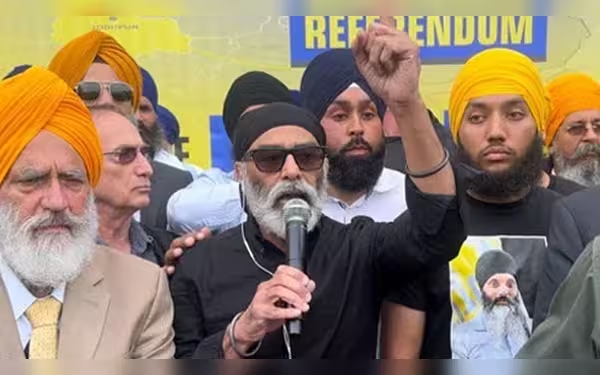Thursday, November 7, 2024 10:03 AM
Khalistani Leader Gurpatwant Singh Pannun Claims Indian Assassination Plot
- Pannun fears for his life amid assassination threats.
- Khalistan Referendum voting set for November 17.
- Legal battle against Indian officials intensifies.
 Image Credits: geo
Image Credits: geoGurpatwant Singh Pannun claims Indian agents plot his assassination, raising tensions amid upcoming Khalistan Referendum.
In a recent interview, Gurpatwant Singh Pannun, a prominent Khalistani separatist leader based in the United States, expressed serious concerns regarding his safety. Pannun, who leads the pro-Khalistan group Sikhs for Justice, claims that Indian intelligence agents are still plotting to assassinate him. This alarming statement comes in the wake of a foiled assassination attempt that has raised questions about the extent of India's reach in targeting activists abroad.
Pannun's remarks highlight a growing tension between the United States and India, particularly concerning the treatment of Sikhs and other minority groups. He stated, "The risk has increased," emphasizing that the Indian government has not faced any repercussions for its actions. Pannun's determination to continue advocating for the independence of Punjab from India remains unwavering, as he prepares for the upcoming Khalistan Referendum voting scheduled for November 17 in Auckland, New Zealand.
In his interview, Pannun revealed that he has taken significant security measures, including hiring five security guards to protect him. He noted, "I can continue to fight for the liberation of Punjab only if I stay alive." This statement underscores the gravity of the situation he finds himself in, as he navigates the complexities of international politics while advocating for his cause.
The assassination plot against Pannun was reportedly disrupted when an Indian national, under the direction of Indian intelligence, mistakenly hired an undercover U.S. agent posing as a hitman. This incident has not only embarrassed the Biden administration but has also raised questions about the nature of U.S.-India relations. Daniel Markey, a former State Department official, remarked on the delicate balance the U.S. must maintain in its dealings with India, especially in light of such serious allegations.
Furthermore, Pannun's situation is compounded by the recent killing of Hardeep Singh Nijjar, a fellow Sikh separatist in Canada, which Canadian Prime Minister Justin Trudeau attributed to Indian involvement. This has led to heightened tensions between Canada and India, with Canada firmly standing by its accusations.
As Pannun continues to advocate for the Khalistan movement, he has also filed a civil case in the U.S. against senior Indian officials, alleging their involvement in the assassination attempt. However, Indian officials have dismissed these claims as "unsubstantiated" and "unwarranted." This ongoing legal battle adds another layer of complexity to an already fraught situation.
Gurpatwant Singh Pannun's situation serves as a stark reminder of the challenges faced by activists advocating for minority rights in a global context. His determination to pursue the Khalistan cause, despite the threats to his life, raises important questions about the responsibilities of governments to protect their citizens abroad. As the world watches, the unfolding events will likely have significant implications for international relations, particularly between the U.S., India, and Canada. The need for a robust dialogue on human rights and the protection of activists has never been more pressing.













